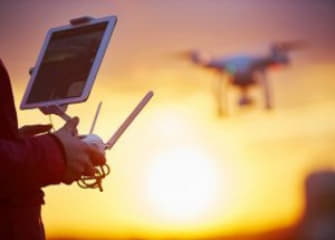
Drones, also known as unmanned aerial vehicles (UAV) or unmanned aircraft systems (UAS), are rapidly becoming a practical technological tool in various contexts beyond recreation. They can be used to survey a construction site, save first responders’ lives, and deliver your groceries. From photography to inspection to asset management, real estate developers and homebuilders alike are using drones for commercial purposes such as to design, monitor, and market their buildings. With costs decreasing and popular adoption of the technology on the rise, industry analysts and policymakers expect this trend to continue into 2020 and beyond.
Nonetheless, while the Federal Aviation Administration (FAA) has published rules regulating the use of drones, analogous state law remains scant and unclear. Be they hobbyists, commercial real estate developers or homeowner association leaders, individuals and organizations seeking to use or manage the use of drones in Maryland need to be aware of their legal options and obligations.
What Does Federal Law Say About Drones?
The FAA classifies drones by size, into two distinct categories: (i) vehicles that weigh less than 55 pounds; and (ii) vehicles that weigh 55 pounds or more. Most drones that civilians use fall under the first category. In the absence of a 107 Waiver, these small, unmanned aircraft may only be flown during daytime hours (including 30 minutes before sunrise and 30 minutes after sunset), no higher than 400 feet above ground level and no faster than 100 miles per hour. Additionally, a drone must stay within its operator’s visual line of sight at all times. A full summary of the FAA’s latest rule can be found here.
Anyone who seeks to pilot a drone for money-making purposes, such as commercial photography or security, must obtain a Remote Pilot Certificate. The Certification entails a multiple-choice test, a TSA background check, and a $150 fee. If you want to fly a drone for exclusively recreational purposes, you still need to register your drone with the FAA. Drones weighing less than 0.55 pounds do not need to be registered at this time.
What Can You Do If You Suspect Someone Is Harassing You With a Drone or Operating a Drone Illegally?
From time to time, a drone may present a threat to privacy or safety. Many drones are equipped with cameras, and people who notice these unmanned vehicles flying overhead or past their windows may worry that someone is spying on them. Further, drone accidents can cause bodily harm or damage to property.
For these reasons, Homeowners Associations may want to restrict the use of drones in their common spaces. Commercial developers may feel similarly about protecting their sites and lots. Unfortunately, few cases involving drones have made it to Maryland courts, and state law on the subject is currently ambiguous.
To date, seventeen states have passed legislation regarding the operation of drones. Maryland is not one of these states. That means that the matter is largely up to local authorities and their discretion.
What Does the Future Hold for Drones in Maryland?
The Maryland General Assembly is scheduled to reconvene on January 11, 2017. State lawmakers may introduce bills regulating drones but the issue does not appear to be a priority. Until Maryland courts begin to hear more disputes about drones, UAVs/UASs will continue to be regulated on the federal level alone, with violations possibly enforced on a case-by-case basis by local authorities in Maryland.
We will continue monitoring legal developments in this area and update this information with any new regulations that come to pass. In the meantime, if you have any questions about drones, or any Maryland real estate, land use, or zoning matters, please feel free to get in touch with me.
ABOUT TRACIE CLABAUGH

Tracie Clabaugh assists real estate developers, homebuilders, lenders and homeowners with a wide variety of real estate transactions and land use and zoning matters.
She also prepares, reviews and negotiates real estate contracts and leases (both commercial and residential), prepares easements and other agreements for real estate development projects, and reviews title work for real estate transactions and in conjunction with real estate development projects.
Previously, Tracie worked for a regional law firm in its land use and zoning department assisting clients with real estate development issues. She also worked for a local title company and as a judicial law clerk.
ABOUT OFFIT KURMAN
Offit Kurman is one of the fastest-growing, full-service law firms in the Mid-Atlantic region. With over 130 attorneys offering a comprehensive range of services in virtually every legal category, the firm is well positioned to meet the needs of dynamic businesses and the people who own and operate them. Our ten offices serve individual and corporate clients in the Maryland, Delaware, New Jersey, and Northern Virginia markets, as well as the Washington DC, Baltimore, Philadelphia, and New York City metropolitan areas. At Offit Kurman, we are our clients’ most trusted legal advisors, professionals who help maximize and protect business value and personal wealth. In every interaction, we consistently maintain our clients’ confidence by remaining focused on furthering their objectives and achieving their goals in an efficient manner. Trust, knowledge, confidence—in a partner, that’s perfect.
You can connect with Offit Kurman via our Blog, Facebook, Twitter, Google+, YouTube, and LinkedIn pages. You can also sign up to receive Law Matters, Offit Kurman’s monthly newsletter covering a diverse selection of legal and corporate thought leadership content.
MARYLAND | PENNSYLVANIA | VIRGINIA| NEW JERSEY | NEW YORK | DELAWARE | WASHINGTON, DC















